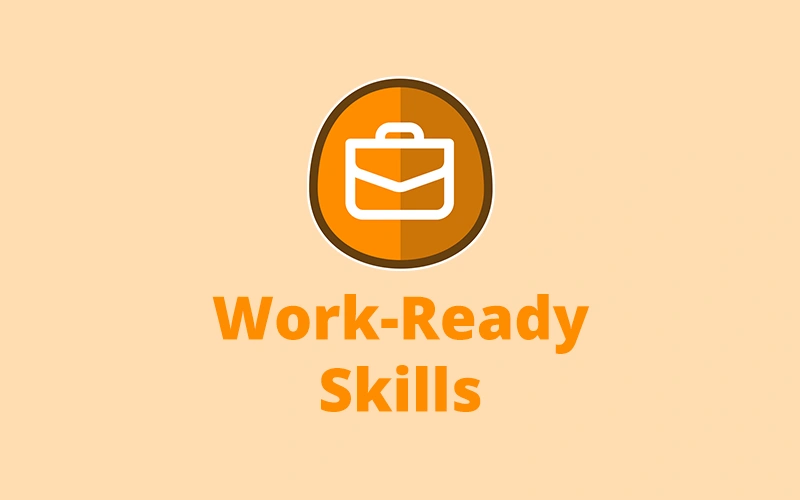In today’s competitive job market, possessing the right skills is paramount. While technical expertise is important, “work-ready skills” – those fundamental abilities that enable you to thrive in any professional environment – are equally crucial. This post explores these essential skills, providing practical advice on how to develop and showcase them.
Why Work-Ready Skills Matter
Work-ready skills are the bedrock of professional success. They empower you to navigate workplace dynamics, contribute effectively to teams, and adapt to evolving industry demands. These skills bridge the gap between theoretical knowledge and practical application, making you a valuable asset to any organisation.
Strong Work-Ready Skills Benefit Individuals by:
- Increased Employability: Employers actively seek candidates with well-developed work-ready skills, making you more competitive in the job market.
- Enhanced Productivity: These skills streamline your workflow, improve efficiency, and enable you to deliver high-quality results.
- Greater Confidence: Mastering work-ready skills boosts your self-assurance, allowing you to tackle challenges with greater ease and assertiveness.
- Career Advancement: Demonstrating proficiency in these areas positions you for promotions and leadership opportunities.
For Organisations, Strong Work-Ready Skills Among Employees Translate to:
- Improved Team Performance: Employees with strong work-ready skills collaborate more effectively, leading to increased productivity and innovation.
- Reduced Training Costs: Employees who possess fundamental workplace skills require less onboarding and training, saving the company time and resources.
- Increased Employee Satisfaction: Employees who feel competent and confident in their abilities are more engaged and satisfied in their roles.
- Enhanced Organisational Agility: A workforce equipped with adaptable and transferable skills is better prepared to navigate change and embrace new opportunities.
Key Elements of Personal Growth
- Problem-Solving
- Analytical Thinking: Breaking down complex issues into smaller, manageable parts to identify root causes and develop effective solutions.
Practice: When faced with a challenge, take a step back and analyse the situation systematically. Identify the core problem, brainstorm potential solutions, and evaluate their feasibility. - Critical Thinking: Objectively evaluating information, identifying biases, and forming well-reasoned judgments.
Practice: Practice questioning assumptions and seeking evidence to support claims. Engage in discussions and debates to refine your critical thinking skills. - Decision-Making: Choosing the best course of action based on available information and potential consequences.
Practice: When making a decision, consider the pros and cons of each option, evaluate the risks and rewards, and choose the path that aligns with your goals.
- Analytical Thinking: Breaking down complex issues into smaller, manageable parts to identify root causes and develop effective solutions.
- Time Management
- Prioritisation: Identifying and focusing on the most important tasks to maximise productivity.
Practice: Use tools like the Eisenhower Matrix (urgent/important) to prioritise your to-do list. Focus on high-impact activities first. - Organisation: Maintaining a structured and efficient workspace, both physically and digitally.
Practice: Develop a system for organising your files, emails, and tasks. Use calendars and project management tools to stay on track. - Meeting Deadlines: Consistently completing tasks within the allocated timeframes.
Practice: Break down large projects into smaller milestones with deadlines. Set reminders and track your progress regularly.
- Prioritisation: Identifying and focusing on the most important tasks to maximise productivity.
- Basic Business Maths
- Calculations: Performing fundamental mathematical operations, including addition, subtraction, multiplication, division, percentages, and ratios.
Practice: Familiarise yourself with common business calculations, such as profit margins, discounts, and interest rates. - Data Analysis: Interpreting and drawing conclusions from data to inform decision-making.
Practice: Practice analysing data sets and creating charts and graphs to visualise trends and patterns. - Financial Literacy: Understanding basic financial concepts, such as budgeting, accounting, and investment.
Practice: Read books or articles on personal finance and business finance to improve your financial literacy.
- Calculations: Performing fundamental mathematical operations, including addition, subtraction, multiplication, division, percentages, and ratios.
- Adaptability
- Flexibility: Adjusting to changing circumstances and embracing new challenges.
Practice: Be open to new ideas and approaches. Practice stepping outside of your comfort zone and taking on unfamiliar tasks. - Resilience: Bouncing back from setbacks and learning from mistakes.
Practice: Develop a growth mindset and view challenges as opportunities for learning and growth. - Continuous Learning: Actively seeking opportunities to expand your knowledge and skills.
Practice: Stay up-to-date with industry trends and advancements. Attend workshops, conferences, and online courses.
- Flexibility: Adjusting to changing circumstances and embracing new challenges.
Work-ready skills are not innate; they are developed through practice and experience. By focusing on these core competencies, you can significantly enhance your career prospects and achieve your professional goals. In our next post, we’ll delve into the essential Digital Skills needed in today’s workplace.
Stay Connected: Subscribe to our newsletter and follow us on social media to get notified when new content is published. We’d love to hear from you! Share your thoughts and experiences in the comments below.

